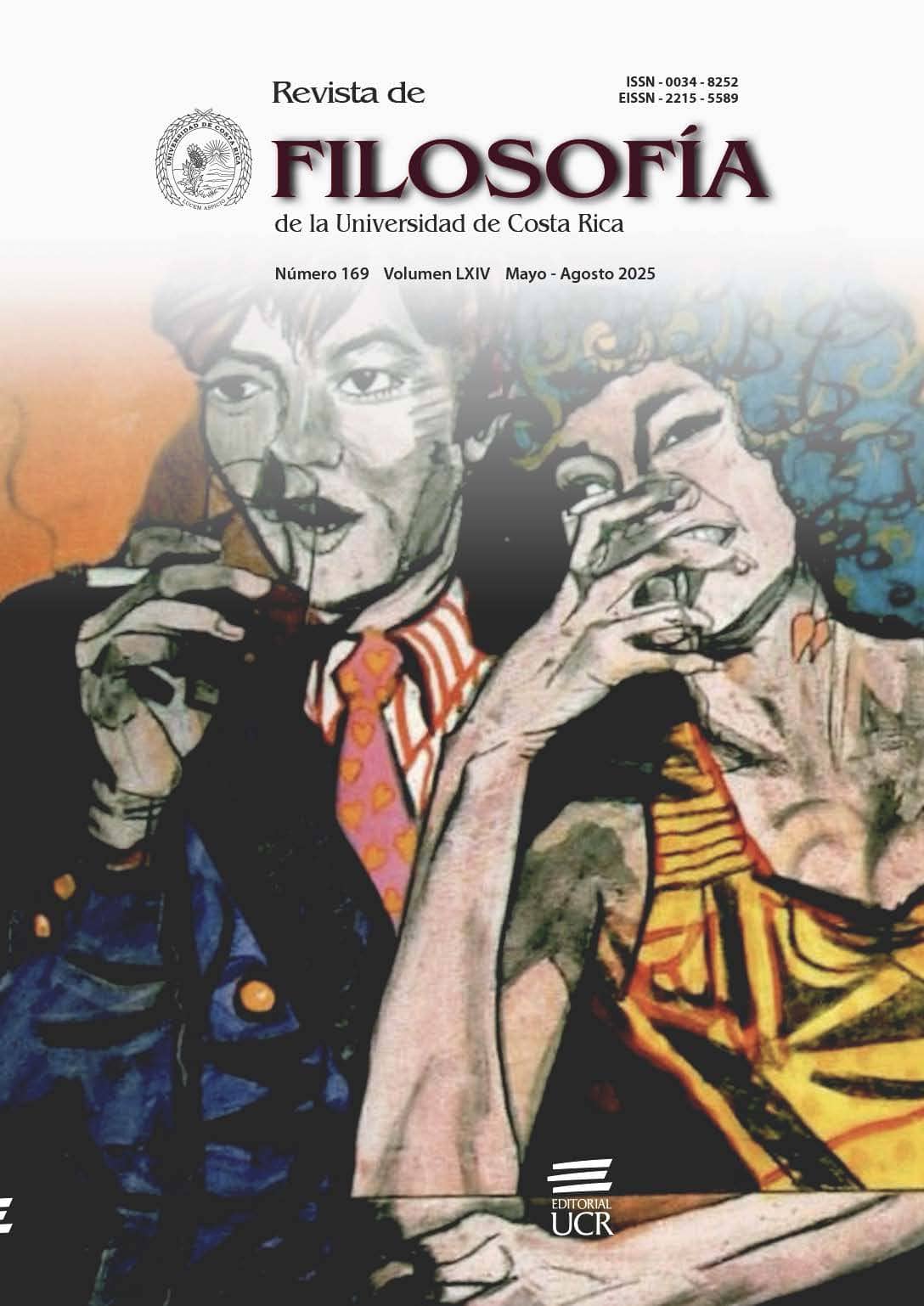Abstract
This paper aims to analyze the role of artificial neural networks in contemporary surveillance and control dynamics, with a particular focus on the epistemic opacity that characterizes them. It argues that, although these technologies have been developed to optimize data extraction in digital capitalism, their opaque and decentralized nature has transformed surveillance into a more subtle and imperceptible phenomenon. Based on this analysis, it is suggested that ANNs can be interpreted within the Foucauldian framework as an update to disciplinary and biopolitical dispositives, expanding the ways in which power is exercised over individuals and populations.
References
Barak, Omri. 2017. «Recurrent neural networks as versatile tools of neuroscience research». Current Opinion in Neurobiology, 46, 1–6. https://doi.org/10.1016/j.conb.2017.06.003
Benavides, Tulio. 2018. «El cuerpo como espacio de resistencia: Foucault, las heterotopías y el cuerpo experiencial». Co-herencia, 16, 247-272. https://doi.org/10.17230/co-herencia.16.30.10
Bishop, Christopher. 2006. Pattern recognition and machine learning. Springer.
Broncano, Fernando. (2025). «Las entrañas de la inteligencia artificial y lo entrañable de su uso». Revista Iberoamericana De Ciencia, Tecnología Y Sociedad - CTS, 20(58), 179–194. https://doi.org/10.52712/issn.1850-0013-700
Castro-Gómez, Santiago (2010). Historia de la gubernamentalidad. Razón de Estado, liberalismo y neoliberalismo en Michel Foucault. Siglo del Hombre Editores.
Cataldo, Héctor. 2024. Acerca de la Internet de las cosas: vigilancia/libertad como información y mercado. Pecado Ediciones.
Chirimuuta, Mazviita. 2020. «Prediction versus understanding in computational enhanced neuroscience». Synthese, 199(4). https://link.springer.com/article/10.1007/s11229-020-02713-0
Christakis, Theodore, Karine Bannelier, Claude Castelluccia y Daniel Le Métayer. 2022. Mapping the Use of Facial Recognition in Public Spaces in Europe – Part 1: A Quest for Clarity: Unpicking the 'Catch-All' Term. https://dx.doi.org/10.2139/ssrn.4110512
Chu, Yan, Fang Huang, Honbin Wang, Guang Li y Xuemeng Song. 2017. «Short-term recommendation with recurrent neural networks». IEEE International Conference on Mechatronics and Automation (ICMA), Takamatsu, Japan, pp. 927-932, https://doi.org/10.1109/ICMA.2017.8015940.
Coeckelbergh, Mark (2022). The Political Philosophy of AI. Polity.
Covington, Paul, Jay Adams y Emre Sargin. 2016. «Deep Neural Networks for YouTube Recommendations». Proceedings of the 10th ACM Conference on Recommender Systems (RecSys '16). Association for Computing Machinery, New York, NY, USA, 191–198. https://doi.org/10.1145/2959100.2959190
Caponi, Sandra. 2014. «Clasificar y medicar: la gestión biopolítica». En R. Karmy y P. Monti (Eds.) Biopolíticas, gobierno y salud pública Miradas para un diagnóstico diferencial (pp. 154- 173). Universidad de Chile.
Deleuze, Guilles. 1973. Foucault. Paidos Studios.
De Regt, Henk W., y Dieks, Dennis. 2005. «A Contextual Approach to Scientific Understanding». Synthese, 144: 137-70. https://doi.org/10.1007/s11229-005-5000-4.
Durán, Juan Manuel y Jongsma, Karin Rolanda. 2021. «Who is afraid of black box algorithms? On the epistemological and ethical basis of trust in medical AI». Journal of Medical Ethics, 47(5), 329-335. https://doi.org/10.1136/medethics-2020-106820
Feurer, Matthias y Hutter, Frank. 2019. «Hyperparameter Optimization». En: Hutter F., Kotthoff, L., & Vanschoren, J. (eds.) Automated Machine Learning: Methods, Systems, Challenges (pp. 3-33). Cham: Springer Nature Switzerland.
Foucault, Michel. 2019. Microfísica del poder. Siglo XXI Editores
Foucault, Michel. 1994. Vigilar y castigar. Siglo XXI Editores
Foucault, Michel. 1996. La verdad y las formas jurídicas. Barcelona: Gedisa.
Foucault, Michel. 2001. Defender la sociedad. Curso del College de France. 1975- 1976. Fondo de Cultura Económica
Foucault, Michel. (2006). Seguridad, territorio y población. Curso del College de France. 1977- 1978. Fondo de Cultura Económica
Foucault, Michel. (2007). Nacimiento de la biopolítica. Curso del College de France. 1978- 1979. Fondo de Cultura Económica
García, Luis. 2011 «¿Qué es un dispositivo?: Foucault, Deleuze, Agamben». A parte rei. 74, 1- 8. http://serbal.pntic.mec.es/AParteRei/
Goodfellow, Ian, Yoshua Bengio y Aaron Courville. 2016. Deep Learning. The MIT Press.
Hawkins, Jeff y Blakeslee, Sandra. 2005. On Intelligence: How a New Understanding of the Brain Will Lead to the Creation of Truly Intelligent Machines. St. Martin’s Griffin.
Hernández, Rigoberto. 2013. «La positividad del poder: la normalización y la norma». Teoría y crítica de la psicología, 3, 81- 102. https://www.teocripsi.com/ojs/index.php/TCP/article/view/105
Jiang, Miao, Ziyi Yang y Chen Zhao. (2017). «What to play next? A RNN-based music recommendation system. En 2017 51st Asilomar Conference on Signals, Systems, and Computers, 356-358. https://doi.org/10.1109/ACSSC.2017.8335200.
Morozov, Evgeny. (2023). «The True Threat of Artificial Intelligence». The New York Times, 30 de junio. Recuperado de:
https://www.nytimes.com/2023/06/30/opinion/artificial-intelligence-danger.html.
Nielsen, Michael. 2015. Neural Networks and Deep Learning. Determination Press.
Rubio, Erick, Leandro Giri y Andrés Ilcic. 2023. «Desafíos epistemológicos en la era de las redes neuronales artificiales: abordando sistemas complejos desde una perspectiva computacional». Argumentos de razón técnica, 26, 145-178. https://doi.org/10.12795/Argumentos/2023.i26.06
Russell, Stuart y Norvig, Peter. 2020. Artificial Intelligence: A Modern Approach (4th Edition). Pearson.
Srnicek, Nick. 2017. Platform capitalism. Polity Press.
Taigman, Yaniv, Ming Yang, Marc’ Aurelio Ranzato y Lior Wolf. 2014. «DeepFace: Closing the Gap to Human-Level Performance in Face Verification». IEEE Conference on Computer Vision and Pattern Recognition, Columbus, OH, USA, 2014, pp. 1701-1708. https://doi.org/10.1109/CVPR.2014.220.
UNESCO. 2022. Recomendación sobre la ética de la inteligencia artificial.
Yuing, Tuillang. 2014. «Biopolítica y clínica: Notas para una pregunta por el individuo». En R. Karmy y P. Monti (Eds.) Biopolíticas, gobierno y salud pública Miradas para un diagnóstico diferencial (89- 110). Universidad de Chile.
Zhang, Suai, Lina Yao, Aixin Sun, y Yi Tay. 2018. «Deep Learning based Recommender System: A Survey and New Perspectives». ACM Computing Surveys 1 (1): 1–35. https://arxiv.org/abs/1707.07435.
Zuboff, Shoshana. 2019. The age of surveillance capitalism: The fight for a human future at the new frontier of power. PublicAffairs.
##plugins.facebook.comentarios##

This work is licensed under a Creative Commons Attribution-NonCommercial-NoDerivatives 3.0 Unported License.
Copyright (c) 2025 Revista de Filosofía de la Universidad de Costa Rica

